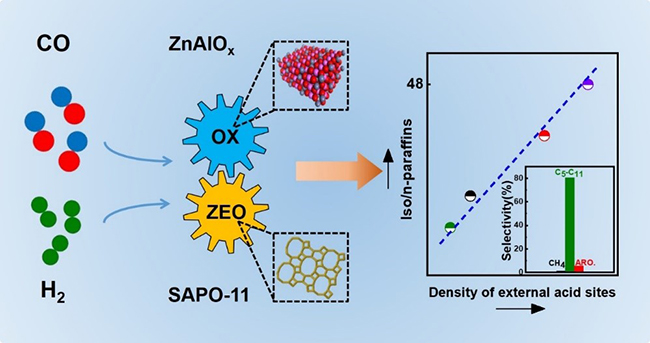Syngas is a key platform for the utilization of carbon resources including coal, natural gas, and biomass. The key to syngas chemistry lies in the controlled C-C coupling toward desired products without forming byproducts, which remains a challenge.
Previously, a research team led by Prof. PAN Xiulian and Prof. BAO Xinhe from the State Key Laboratory of Catalysis(SKLC) developed a new catalyst concept based on metal oxide-zeolite (OXZEO) bi-functional catalysts, and it enabled the direct conversion of syngas to a variety of chemicals and fuels with high selectivity, such as light olefins, ethylene, gasoline, aromatics and oxygenates. The OXZEO concept provided a new technology platform for the highly efficient utilization of coal and other carbon resources.
Recently, this team realized the direct synthesis of isoparaffin-rich gasoline from syngas using ZnAlOx-SAPO-11 OXZEO catalysts. They elucidated the active sites of isoparaffin formation, which provided important guidance for the one-step synthesis of high-quality gasoline from syngas.
This study was published in ACS Energy Letters on March 23.

Direct syngas conversion to isoparaffin-rich gasoline over OXZEO catalyst (Image by FENG Jingyao)
They achieved 34% CO conversion and 82% gasoline selectivity by modulating the acid sites distribution of zeolite, in which the iso/n-paraffins ratio was as high as 38. By optimizing the reaction conditions, they increased the ratio of iso/n-paraffins as high as 48, which was the highest value of the iso/n-paraffins ratio reported so far.
Moreover, a 150 hours-time on stream test of the catalyst indicated rather stable activity in syngas-to-gasoline.
Further studies showed that the external acid sites of the zeolite could be the active sites for the formation of branched, especially the multi-branched isoparaffins.
"This study provided important guidance for the one-step synthesis of high-quality gasoline from syngas and even CO2," said Prof. PAN.
The above work was supported by the Ministry of Science and Technology of China, the National Natural Science Foundation of China, the Dalian High-level Talent Innovation Program, and the Youth Innovation Promotion Association of CAS. (Text by FENG Jingyao)